Starting from 2018, Vanke Foundation, Zero Waste Hub, and Shenzhen One Foundation have jointly launched the "Zero Waste Day" national public advocacy activity, which is held on the third Saturday of August each year, to strengthen the public's understanding of the zero-waste concept.
We hope to collaborate with individuals, social organizations, enterprises, and other parties to carry out a series of online and offline public welfare experience activities, guide the public to join the Zero Waste Day advocacy activities, promote the concept of "zero-waste", and encourage more people to take actions. Let’s reduce waste together, making "zero-waste" a lifestyle.
Every year, Vanke Foundation carries out various online and offline activities around Zero Waste Day with its partners, continuously exploring more gameplay about zero-waste.
Zero Waste Day Goal
- Reduce Waste Generation
- Effective Implementation of
Waste Classification - National Advocacy and
Behavioral Change
- Reduce waste generation
As economy develops, city expands, and unsustainable consumption patterns grow in popularity, China produces a huge and uncontrolled amount of garbage every year, exacerbating resource and energy consumption and environmental pollution. To reduce the production, consumption, and use of disposable goods through institutional constraints, product redesign, and changes in consumer behavior remains the key of source reduction.
- Effective Implementation of Waste Classification
China now implements a household waste classification system in 46 key cities, and cities at or above the prefecture level have gradually launched household waste classification, gradually replacing the original mixed waste disposal based on landfill incineration. Separating dry and wet garbage and disposing hazardous waste separately, establishing a classification, collection, transportation, and treatment system, and matching corresponding institutional guarantees, are important steps in advancing the process of garbage classification in China.
- National Advocacy and Behavioral Change
Each individual shall support and actively participate in waste reduction and classification at the source to achieve the "carbon peaking and carbon neutrality" goals. Only by establishing a publicity and education system for waste reduction and classification, enhancing public awareness of waste reduction and classification, and truly transforming it into action, can we achieve the above two goals.
Zero Waste Day Over the Years
- August 18, 2018
The first Zero Waste Day "Take Action to Accelerate Plastic Reduction" was held on August 18, 2018
Zero Waste Hub held its first Zero Waste Day Launching Conference and the "Take Action to Accelerate Plastic Reduction" themed salon and zero-waste activities in Beijing. In addition, Vanke Foundation, Zero Waste Hub, and One Foundation called on 132 domestic organizations to participate in online and offline interactions on Zero Waste Day, and held 60 offline activities in 56 cities across the country.
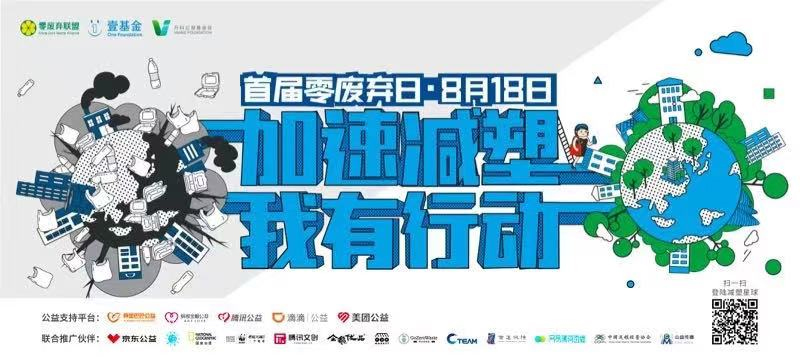
- August 17, 2019
The second Zero Waste Day "Garbage Sorting Together FUN" was held on August 17, 2019
Vanke Foundation, Zero Waste Hub, and One Foundation have launched four themed activities in Beijing, Shanghai, and Shenzhen, respectively Beijing Xishan Courtyard Community Activity, the Zero Waste Day Theme Market organized by the Beijing Farmers’ Market, the Theme Salon organized by the Shenzhen Longhua District Zero Waste Promotion Association, and the Shanghai Theme Salon organized by Shanghai Aifen Environmental Protection Technology Consulting Service Center and Shanghai Hongkou New Fashion Garbage Classification Firm. over 60 offline activities were conducted and 186 partners from over 80 cities across the country participated in online and offline interactions on Zero Waste Day.
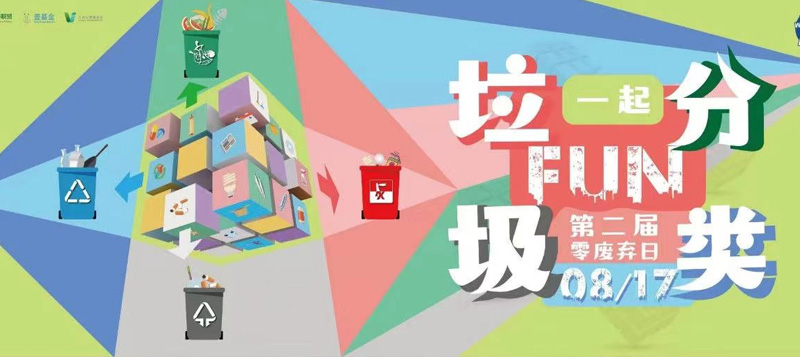
- August 15, 2020
The third Zero Waste Day "Zero Waste Life ? Do It Now" was held on August 15, 2020
Vanke Foundation, Zero Waste Hub, and One Foundation collaborated with 147 organizations in 76 cities across the country to carry out a variety of Zero Waste Day activities simultaneously online and offline. They launched "Look for Rural Life in the City" H5, released the themed animation "The Zero Waste Practice of the A Meng Family", initiated the "Garbage Map Snapshot Activity", and held the "Zero Waste Day" theme activity at the Shenzhen SCPG Center. They collaborated online and offline efforts to promote the public to participate and advocate garbage classification and recycling in daily life scenarios such as homes, communities, schools, and urban public spaces on a greater scale.
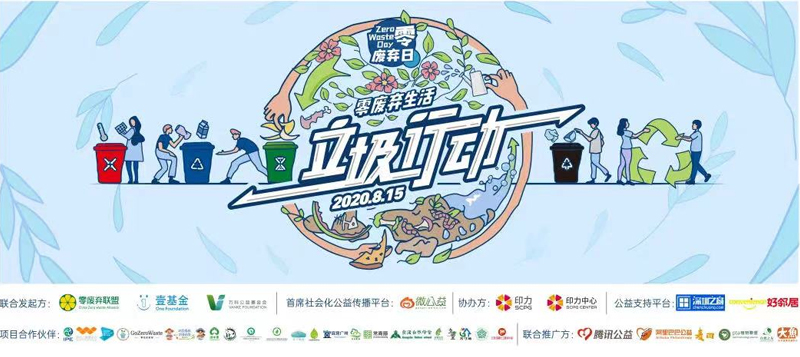
- August 21, 2021
The 4th Zero Waste Day “Low Carbon, Light Life” was held on August 21, 2021
Vanke Foundation, Zero Waste Hub, and One Foundation have launched online and offline activities with 173 organizations in nearly 70 cities across the country - multiple zero-waste life advocators such as Wang Shi, Jane Goodall, Du Xiangwan, Rui Xinyue, Hu Ge, were invited to participate in the online activity of “Low Carbon, Light Life”. The Z Generation Zero Waste Life Report press conference was held in Gala, Vanke Plaza, Shenzhen, and the video of One Zero Waste Day was released. From August 25th to September 7th, Vanke Foundation, together with Lens and Little Red Book, launched an online activity called 'Let's Live a Low Carbon Life Together' and released a popular science stop-motion animation titled What is Low Carbon Life. Dr. Wang Shi and Jane Goodall advocated for a low-carbon lifestyle in Little Red Book, and called on everyone to start from little things around them, and contribute to carbon reduction.
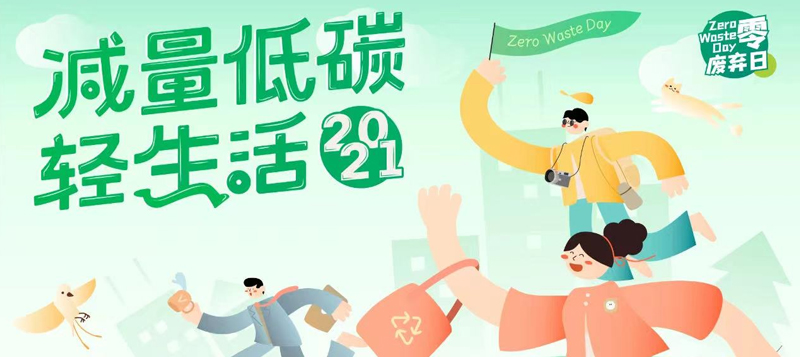
- August 20, 2022
The 5th Zero Waste Day "Live a Just Right Life, Start with Me" was held on August 20, 2022
Zero Waste Day has entered its fifth year, and more and more people are joining us to realize the goal of "zero waste".
Over the past five years, the public has become more aware of sustainability, and many people have begun to focus more on themselves and the urban areas around them. They start to look inside themselves, pay attention to the grass and trees, and embark on a more sustainable life. That being said, the theme of Zero Waste Day in 2022 has been set as "Live a Just Right Life, Start with Me".
Many people have some useful life tips - save two yuan with our own cup, transform a cardboard box into a cat house, wrap the roots and refrigerate them for longer storage...Do you know that these tips advocate the concept of zero waste? On the Zero Waste Day in 2022, 22 bloggers from different fields shared their zero-waste practices in daily life. Their experiences have been organized into a "just right life" tip and shared with more friends who anticipate a sustainable zero-waste life.
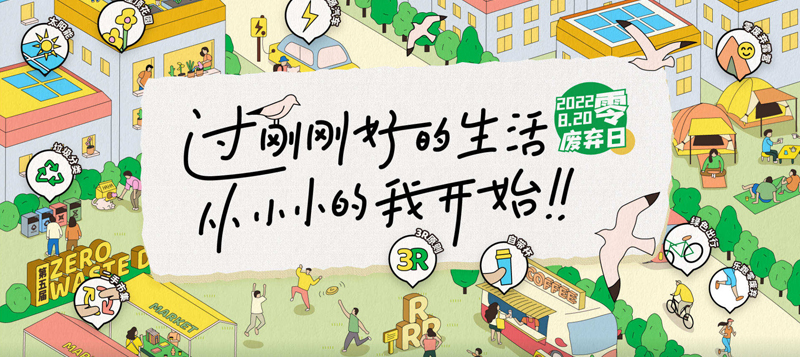
- August 19, 2023
The 6th Zero Waste Day “Start from ‘Zero’ and Live Freely” was held on August 19, 2023
In the current era of "involution" and "lying flat", "making money" and "slack off", more and more people begin to re-examine their lifestyle and consumption habits, pay more attention to their emotions, and pursue a freer life. Perhaps we can try to start from 'zero' together to stabilize our hearts in this complex world, explore our most authentic needs, and find the most suitable pace of life.
“Zero waste” does not mean that no waste is generated at all, but rather a life attitude of “avoiding waste as much as possible”. Each and every one of us can start from “zero”, cherish every item and every emotion, make more space for life, and build a sustainable future together.
We hope to unite more individuals, social organizations, enterprises and other forces to carry out a series of theme advocacy activities, guide the public to join Zero Waste Day, make "zero-waste" a lifestyle, and let more people embrace the "zero-waste" lifestyle.
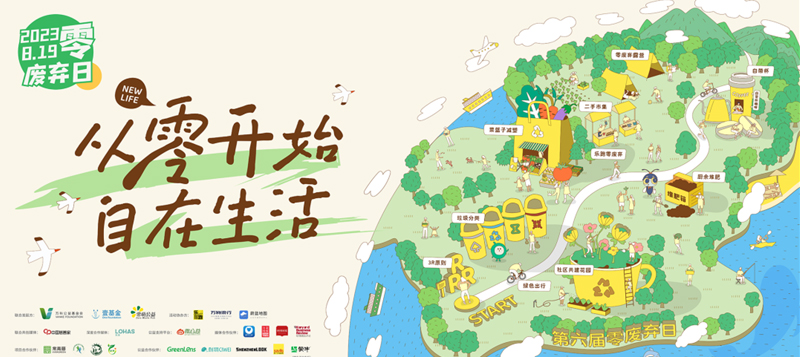
The Palace Museum Zero-Waste Program
The Palace Museum Zero-Waste Program, launched in 2020, adopts a scientific and refined waste management approach based on the widespread participation of audiences and the public, and aims to pursue the goal of "reducing landfill and incineration waste to zero as much as possible" at the Palace Museum. It steadily promotes the work related to "zero-waste office" and "zero-waste travel" in stages and steps including optimizing the comprehensive infrastructure construction such as waste classification, and strengthening zero waste training and Empty Plate Campaign. It directly leads about 3,000 staff of the Palace Museum, 11 million visitors, and 40,000 tour guides to join in the action of building a green Palace Museum, making "zero-waste" a habit. At the beginning of 2022, the Foundation and the Palace Museum signed a new five-year strategic cooperation agreement, with the purpose of further deepening zero-waste practices and contributing to the construction of ecological civilization in China.
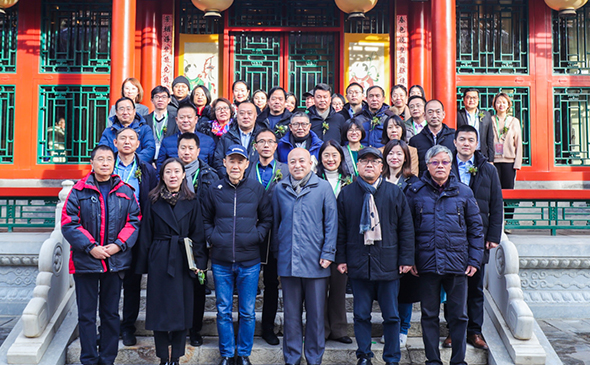
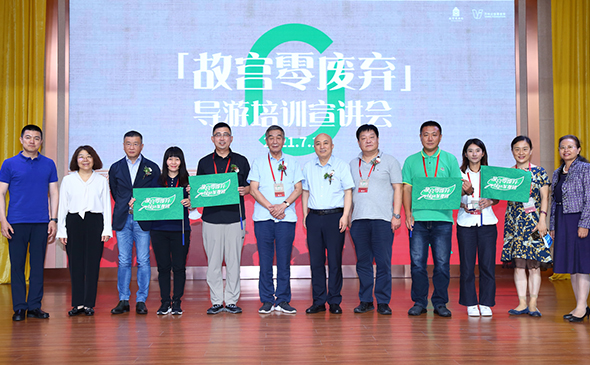

Back
